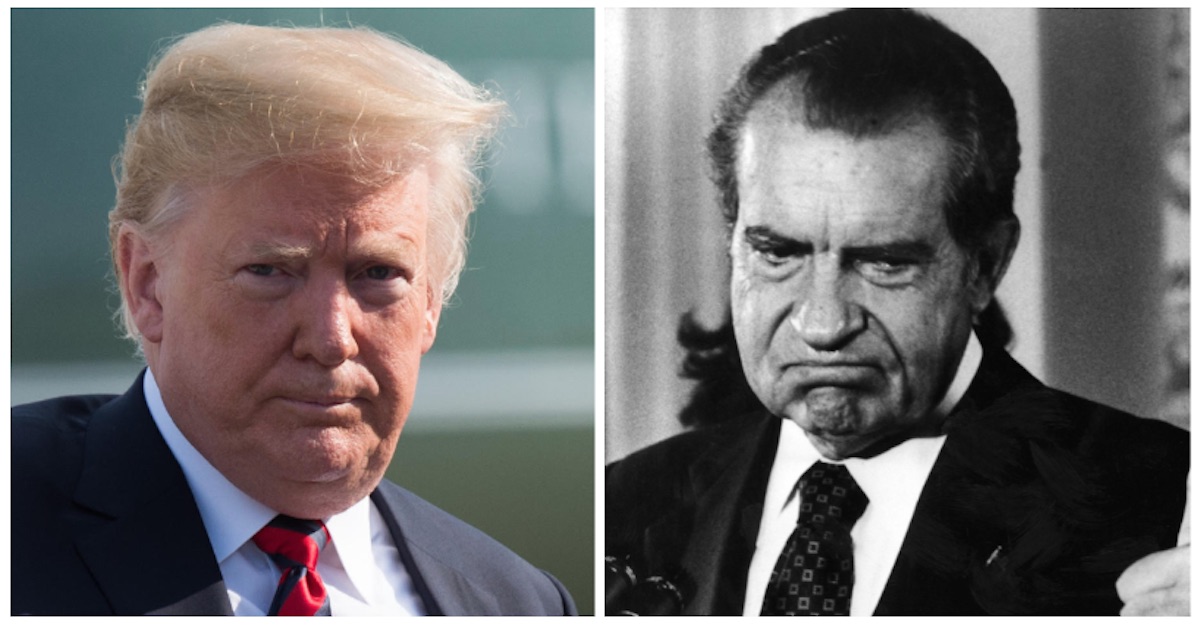
Remember when those crazy Lincoln-Kennedy coincidences were the most astounding presidential parallels? Well, now that we’re making America great again, nostalgia has an entirely different look. July 24 will mark forty-five years since the Supreme Court of the United States unanimously voted to order President Richard Nixon to turn over the Watergate tapes.
Supreme Court, 8-0 (with William Rehnquist recusing himself) , ordered Richard Nixon to surrender Watergate tapes 45 years ago tomorrow: pic.twitter.com/49kMeLBFnH
— Michael Beschloss (@BeschlossDC) July 23, 2019
July 24 will also be the date when Robert Mueller will be testifying before Congress about Donald Trump’s official and unofficial actions investigated when Mueller served as Special Counsel.
For decades, Nixon was the go-to example of official misconduct. Even those who stood squarely behind Nixon’s political agenda condemned him for his crimes and cover-ups, and the entire Supreme Court smacked down Nixon’s attempt evade the letter and spirit of the Constitution. U.S. v. Nixon raised questions about the limits of presidential immunity, the relationship between the three branches of government, and the distinction between public and private. Given that those issues are frighteningly relevant today, it’s worth taking a closer look at what the ’74 bench said.
The controversy in Nixon’s case was over a subpoena issued for, “certain tapes, memoranda, papers, transcripts, or other writings relating to certain precisely identified meetings between the President and others,” having to do with the infamous break-in at the Watergate Hotel.
When Nixon moved to quash the subpoena, he made a preliminary argument that seems positively Trumpesque: that the court lacked jurisdiction to issue the subpoena in the first place because the dispute was between two executive officials (the special counsel and the president). According to Nixon, because the matter was essentially an intra-branch dispute, the court had no authority to resolve it.
SCOTUS had no time for Nixon’s argument, and reminded him that the matter at hand was a pending criminal prosecution:
It is a judicial proceeding in a federal court alleging violation of federal laws, and is brought in the name of the United States as sovereign.
Unless and until the Attorney General revoked the authority of the Special Counsel, the investigation could proceed, subpoenas and all. Any questions or disputes over subpoenas, therefore, are exactly what courts are there to resolve.
Nixon also tried to quash the subpoenas on a number of technical grounds, contending they’d issued for an improper purpose, and that they constituted inadmissible hearsay. SCOTUS systematically dismantled Nixon’s reasoning, reminding the president that in the context of the subpoena dispute, he’s nothing more than a criminal defendant.
Trump’s legal maneuvering mirrors Nixon’s in many ways. Trump has often resorted to questioning the authority of courts to settle matters he deems purely executive in scope. So too has Trump attacked the validity of subpoenas, declaring the purpose and procedure of their issuance to be deficient.
The real heart of U.S. v. Nixon, as is that of most Trump controversies, was President Nixon’s claim that as president, he was immune from following the law. Disputing the subpoenas, Nixon broke up the privilege claim into two sub-arguments. First, according to Nixon, “the separation of powers doctrine precludes judicial review of a President’s claim of privilege.”
SCOTUS wasn’t amused with Nixon’s attempt to place himself above the law. Conducting what it called “delicate exercise in constitutional interpretation,” the Court went back to the beginning, writing that under Marbury v. Madison, it’s the Supreme Court’s job to settle disputes between the branches of government.
The second sub-argument advanced by Nixon was that protection of the tapes was necessary to preserve presidential confidentiality. The court disposed of that claim by finding it too tenuous and too general, writing:
While the Constitution diffuses power the better to secure liberty, it also contemplates that practice will integrate the dispersed powers into a workable government. It enjoins upon its branches separateness but interdependence, autonomy but reciprocity.
The Supreme Court’s declaration that Nixon was not above the law was the final word on the topic in a way that Robert Mueller’s testimony will not be. However, the Court’s more nuanced findings — that Nixon was seeking to erode the Constitutional balance of power, or that his take on presidential authority was grossly incorrect — may well find parallel in Mueller’s statements before Congress.
Nixon resigned 16 days after this momentous SCOTUS decision.
[Images via Saul Loeb/AFP/Getty Images, AFP/Getty Images]
This is an opinion piece. The views expressed in this article are those of just the author.